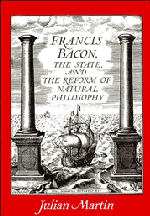6 - A reformed natural philosophy
Published online by Cambridge University Press: 29 September 2009
Summary
The laws of heaven and earth .. are the subject of philosophy.
Advancement of Learning (1605), Works, III, p. 379The administration of the world
Bacon's perspective was always that of a statesman; he believed problems of knowledge were properly part of a statesman's concerns; and he believed a reformed natural philosophy would be a splendid support for the imperial state he desired to see established. Such a natural philosophy would (he said) bring forth knowledge of ‘the causes and secret motions of things’, and produce inventions and useful knowledge for the state and the people. Nevertheless, Bacon argued repeatedly that inventions and the advantages they would bring to the commonweal were never to be mistaken for ‘the true ends of knowledge’.
It is not the pleasure of curiosity, nor the quiet of resolution, nor the raising of the spirit, nor victory of wit, nor faculty of speech, nor lucre of profession, nor ambition of honour or fame, nor inablement for business, that are the true ends of knowledge; some of these being more worthy than other, though all inferior and degenerate: but it is a restitution and reinvesting (in great part) of man to the sovereignty and power (for whensoever he shall be able to call the creatures by their true names he shall again command them) which he had in his first state of creation. And to speak plainly and clearly, it is a discovery of all operations and possibilities of operations from immortality (if it were possible) to the meanest mechanical practice.
- Type
- Chapter
- Information
- Francis Bacon, the State and the Reform of Natural Philosophy , pp. 141 - 171Publisher: Cambridge University PressPrint publication year: 1991



